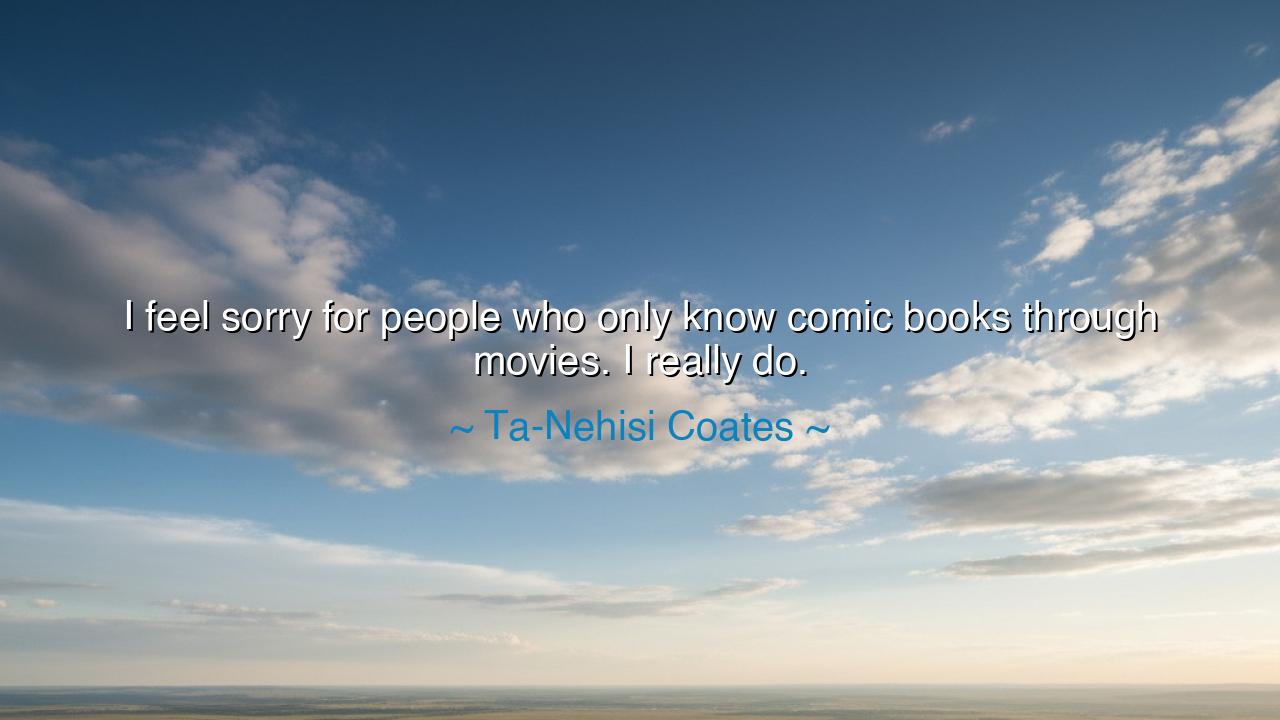
I feel sorry for people who only know comic books through






Hear me, O children of wisdom, for I bring to you a reflection on depth, authenticity, and the power of experience. These are the words of Ta-Nehisi Coates, a writer whose insight into culture and identity has illuminated the hearts and minds of many: "I feel sorry for people who only know comic books through movies. I really do." In these words, Coates speaks to a deeper truth, one that transcends the medium of comics and touches on the nature of artistic expression itself. What he is saying is that when we limit our understanding of something—be it a medium, a culture, or an idea—we miss out on the richness and layers that lie beneath the surface.
Comic books, those often overlooked and undervalued treasures, are not merely about flashy images and superheroes. They are a unique form of storytelling, one that blends visual art with narrative, allowing for a depth of emotional and intellectual engagement that many other forms of art cannot provide. When Coates laments those who only know comic books through movies, he is pointing to the shallow nature of that engagement. Movies, while powerful in their own right, offer a simplified, often watered-down version of the story, one that is bound by time, budget, and the whims of the entertainment industry. In contrast, comic books offer a complexity that allows for a richer, more personal experience, where the reader has the time and space to absorb every detail, every nuance, and every emotion the creator intends.
This distinction between the depth of the original medium and the spectacle of its cinematic adaptation brings to mind the ancient oral traditions of storytelling, where the teller would spin tales that were rich in detail, layered with meaning, and deeply connected to the culture and history of the people. Just as the bards of ancient Greece and Ireland would recount tales of gods, heroes, and battles, so too did comic books once hold a special place in the heart of culture—telling stories that resonated deeply with the reader and reflected the complexities of life and identity. These were not mere entertainment; they were windows into the human experience, offering lessons, insights, and reflections on the world.
But what has happened now, O children, is that movies have come to dominate the cultural landscape, often taking stories and reducing them to their most basic elements in order to appeal to a mass audience. The complexities of comic books—their themes, their intricate storylines, and their rich character development—often get lost in the rush to deliver spectacular visuals and action sequences. The essence of the comic book as an art form is reduced to the flashiness of Hollywood, and what is left behind is a shadow of its true potential. Coates is right to lament this loss, for he knows that those who only encounter comic books through the lens of movies are missing out on the true depth that the medium has to offer.
Consider, O children, the example of the great philosophers—Plato, Aristotle, and Socrates—whose ideas were conveyed not through simple stories or platitudes, but through deep, layered dialogue and reflection. These men did not seek to entertain or to please the masses with easy answers; rather, they sought to engage their audience in a process of deep intellectual exploration, challenging them to think, to question, and to evolve. In much the same way, comic books, when approached with the respect they deserve, have the power to engage readers on a level that goes beyond entertainment. They can provoke thought, inspire reflection, and open up discussions about identity, society, and the complexities of the human soul.
So, O children, let us not be content with the superficiality of easy entertainment, but let us strive to engage with the deeper layers of art, whether that art comes in the form of comic books, literature, or any other medium. As Coates points out, those who only know comic books through movies are missing a world of richness, a world that can teach us much about the human condition. If we truly wish to understand, we must immerse ourselves in the original works, in their complexity, their texture, and their soul. Just as Plato did not write simply to entertain, but to challenge and enlighten, so too must we approach all art with the intention to learn and to grow.
Therefore, O seekers of wisdom, let us honor the art that is before us—not just for its surface appeal but for the depth it offers. Whether it is the comic book, the painting, or the written word, we must strive to see the layers beneath the surface and to recognize the value of true engagement with the work. In doing so, we will not only deepen our own understanding, but we will be better able to see the world with greater clarity and wisdom. Just as the ancient bards shaped their worlds with stories that held meaning beyond the surface, so too can we shape our own lives through art that demands our attention, our thought, and our reflection.






AAdministratorAdministrator
Welcome, honored guests. Please leave a comment, we will respond soon